Russell Garden Vitality: Fall Prep to Prevent Winter Loss
Quick Fall Prep Essentials:
- Clean up leaves to prevent lawn suffocation and disease.
- Aerate and fertilize lawn for strong root growth and spring green-up.
- Decide whether to cut back or leave perennials standing based on plant health and winter interest.
- Plant spring bulbs before the ground freezes.
- Apply mulch to garden beds to insulate soil and prevent frost heave.
- Protect vulnerable trees and shrubs with wraps and guards.
- Clean and store tools, drain water systems.
Introduction: Bracing Your Russell Garden for a Canadian Winter
Hello fellow Russell green thumbs! Isn't autumn in our corner of Ontario just spectacular? The trees put on a fiery show, and there's that crispness in the air – perfect for enjoying one last stroll through your beautiful garden beds. But let's be honest, while we're sipping cider and admiring the fall colours, our plants are probably getting a little nervous. Winter in the wider Ottawa region, as our neighbours in places like Metcalfe and Embrun know all too well, isn't exactly a walk in the park... unless that park is frozen solid! To avoid heartbreak (and empty patches in your landscaping) come spring, a little fall garden prep is essential. Think of it as tucking your plants in with a cozy blanket against the coming frost and snow. This guide is here to walk you through the simple, crucial steps for *winterizing* your Russell garden, ensuring your precious perennials, shrubs, and even young trees survive the deep freeze and return with gusto next year. Let's get those green spaces ready for their long winter's nap!
Need professional help getting ready? Explore our range of yard care services or check out our work on Google!
Why Ottawa Winters Demand Garden Respect: Understanding Local Challenges
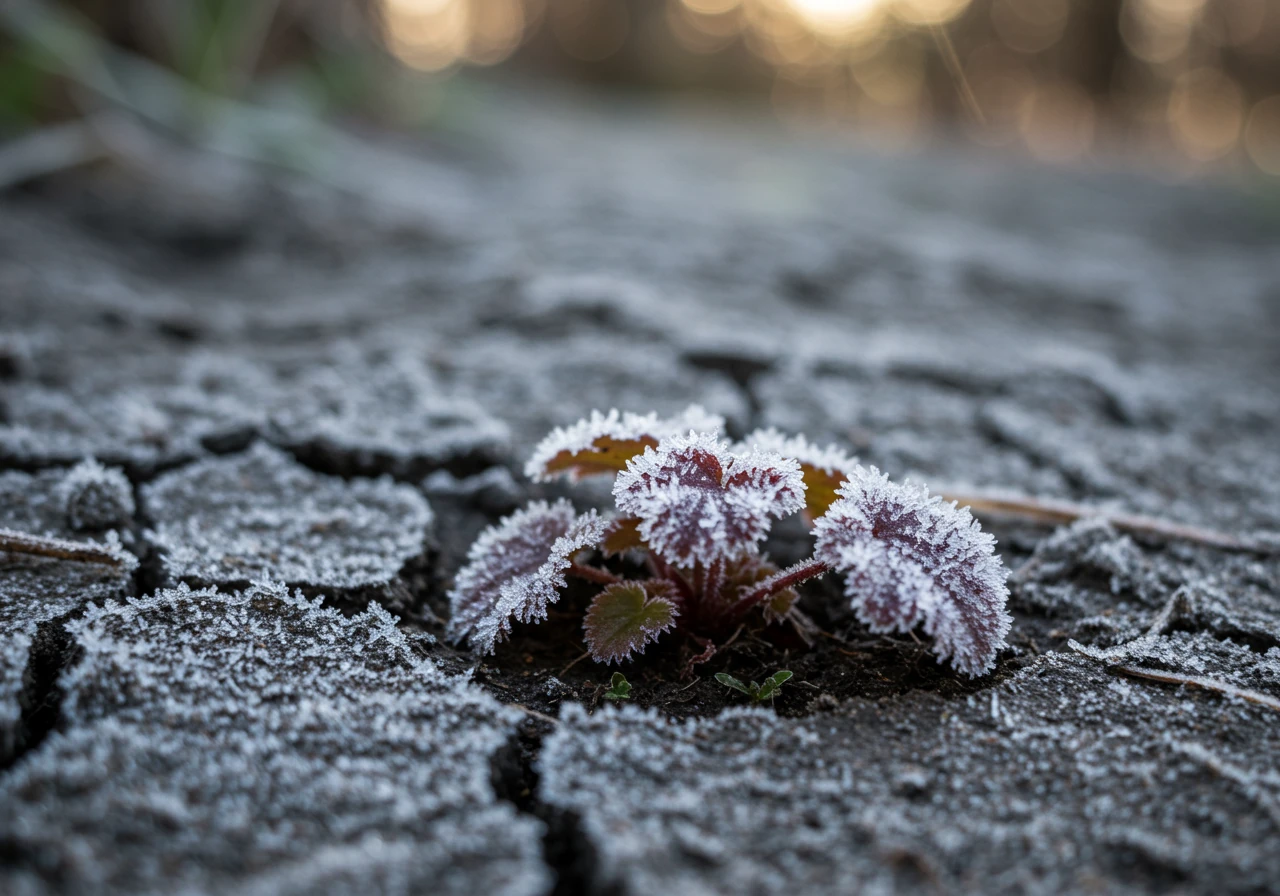
Alright, let's talk turkey – or maybe frozen turkey, given the topic! Gardening in the Ottawa region, including lovely spots like Russell, Manotick, and Greely, isn't *quite* the same as tending a tropical paradise. We're officially in Plant Hardiness Zone 5a/5b, which basically means our winters can get seriously cold, dipping down to temperatures that make even the hardiest lumberjack shiver (around -29°C to -23°C, or -20°F to -10°F, according to Environment Canada climate data). But it's not just the deep freeze we need to think about.
Our local climate throws a few extra curveballs:
- The Freeze-Thaw Shuffle: Ottawa winters rarely just get cold and stay cold. We often experience annoying freeze-thaw cycles. The ground freezes solid, then thaws a bit during a sunny spell or mild snap, only to freeze hard again. This repeated expansion and contraction of water in the soil is called *frost heave*, and it can literally push smaller plants, especially those newly planted in the fall, right out of the ground! Imagine your poor plant roots doing an unwilling cha-cha. Good fall mulching helps moderate soil temperature swings.
- Heavy Snow Load: While a nice snow blanket can insulate the ground, heavy, wet snow (you know the kind!) can snap branches on shrubs and small trees. Gentle brushing off after a heavy snowfall can prevent damage, but be careful not to break brittle, frozen wood.
- Wind Woes: Winter winds can be brutal, drying out evergreen foliage (causing "winter burn") and adding extra chill factor that stresses plants. Planting in sheltered locations or using burlap wraps for sensitive species can make a big difference.
- Clay Soil Conundrums: Many areas around Ottawa, including parts of Russell, Manotick, and Greely, are blessed (or cursed, depending on your perspective!) with heavy clay soil. While often nutrient-rich, clay drains *very* slowly. In winter, this means water sits around plant roots, freezes, and expands, potentially damaging them. Improving drainage through soil preparation and proper grading is key. Understanding your soil is vital; just like you need specific summer care tips for growing vegetables in Russell's clay soil, winter survival also depends on addressing that clay. This also impacts grass roots, making fall lawn seeding strategies for Ottawa clay soil crucial for spring success.
Dealing with these challenges starts in the fall. Proper cleanup prevents pests and diseases from overwintering. Addressing drainage issues *before* the ground freezes is essential. Sometimes, tackling challenging terrain requires more intensive work, like understanding the basics of Russell land clearing techniques if you're starting fresh or dealing with significant drainage problems.
Respecting these local winter conditions means giving your garden the best chance to bounce back strong in the spring. It’s about understanding the unique environment we garden in, from the soil structure influencing secrets to perfect Russell lawn care to the temperature extremes. If preparing your landscape feels overwhelming, remember professional help is available through various landscape maintenance services. A little respect and preparation go a long way toward ensuring a vibrant garden next year!
Lawn CPR: Reviving Your Turf Before the Deep Freeze
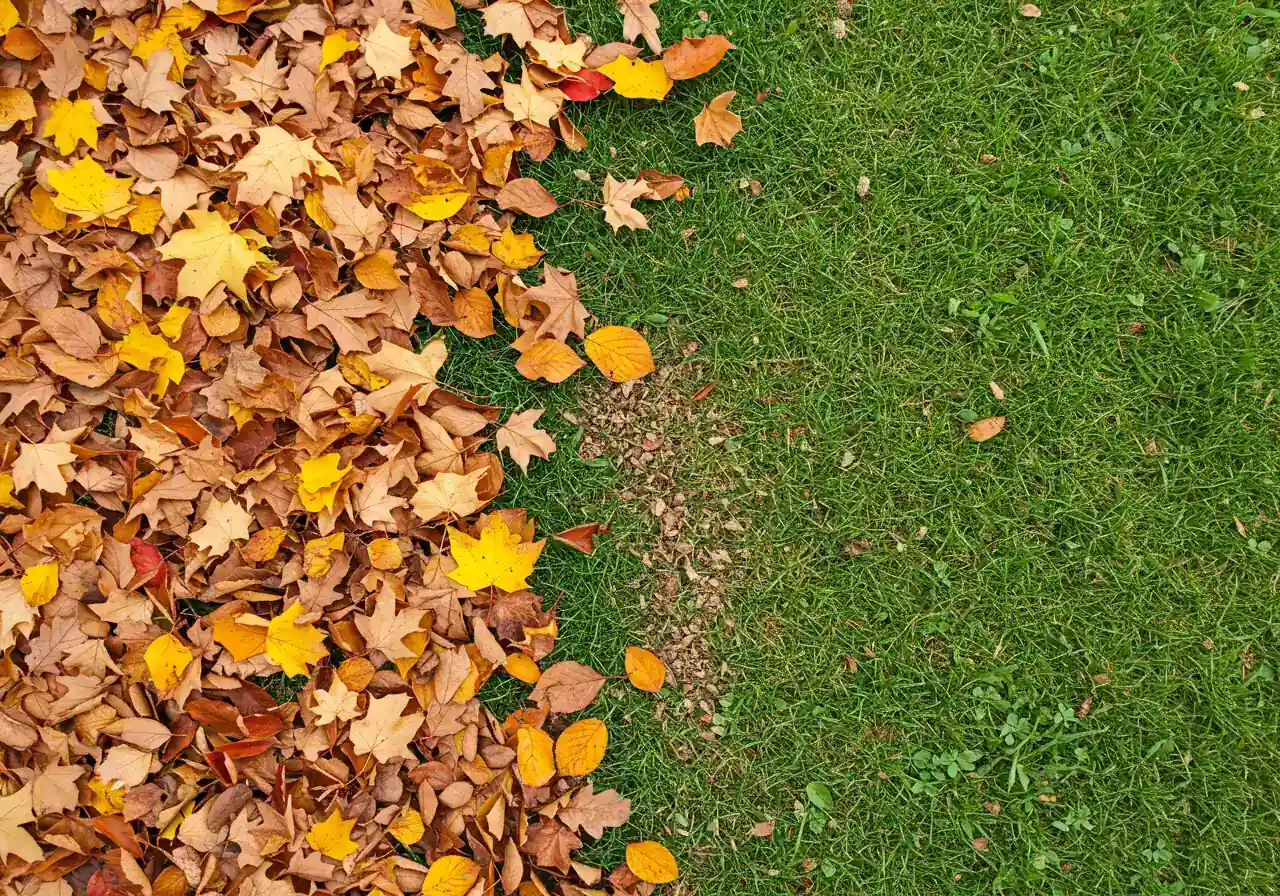
Alright neighbours, let's talk about your lawn. It worked hard all summer, putting up with BBQs, maybe a rogue frisbee or two, and those blistering Ottawa heatwaves. Now, as the colourful leaves start to pile up, it’s tempting to just wave goodbye until spring. But hold on! Giving your lawn a little TLC – think of it as Lawn CPR – *before* the deep freeze sets in is your ticket to a lush, green comeback next year. Ignoring it now can lead to snow mold, weak roots, and a patchy mess come April. Let’s give your grass the best chance to survive winter hibernation!
Here’s your step-by-step guide to tucking your turf in properly, presented as a timeline:
Step 1: Leaf Management
That beautiful blanket of autumn leaves? Gorgeous on the trees, not so great smothering your grass. A thick layer prevents sunlight and air from reaching the turf, inviting disease. Raking is classic, but consider mowing over them (mulching) to add organic matter. For large volumes, consider professional help like our Ottawa yard cleanup service or the specialized Russell yard cleanup service.
Step 2: Aeration
Think of aeration as giving your lawn's roots breathing room. Core aeration pulls soil plugs, relieving compaction (especially in clay soil common in Nepean or Barrhaven). This improves water, air, and nutrient access for stronger roots before winter.
Step 3: Overseeding
Got thin spots? Fall is perfect for overseeding. Warm soil and cooler air help germination. Aerating first creates ideal pockets. Use a quality seed blend suitable for Ottawa. Need advice on materials? Our guide to smart material selection can help.
Step 4: Winterizer Fertilizer
Apply a fall lawn food higher in potassium. This promotes root strength, cold hardiness, and energy storage for spring green-up, rather than leafy growth. Follow package directions before the ground freezes.
Step 5: Final Mow
Keep mowing as needed. For the last cut (late Oct/early Nov), lower the blade slightly to about 2.5 inches (6 cm). This helps prevent snow mold but still allows photosynthesis. Don't scalp it!
Taking these steps might seem like extra chores, but think of the payoff: a healthier, greener lawn next spring! Performing this Lawn CPR sets your turf up for success. These tasks are often included in professional fall landscape maintenance services. When requesting a quote, rest assured we handle your data carefully per our privacy policy.
Tucking In Your Garden Beds: Perennials, Bulbs, and Mulch
Okay, so we've given the lawn its CPR, now let's turn our attention to the main event: the garden beds! Your beautiful borders and landscaping features also need a bit of pampering before the Ottawa winter truly settles in. Tucking in your perennials, planting those hidden spring treasures (bulbs!), and adding a cozy mulch blanket are key steps to ensure a vibrant return next year.
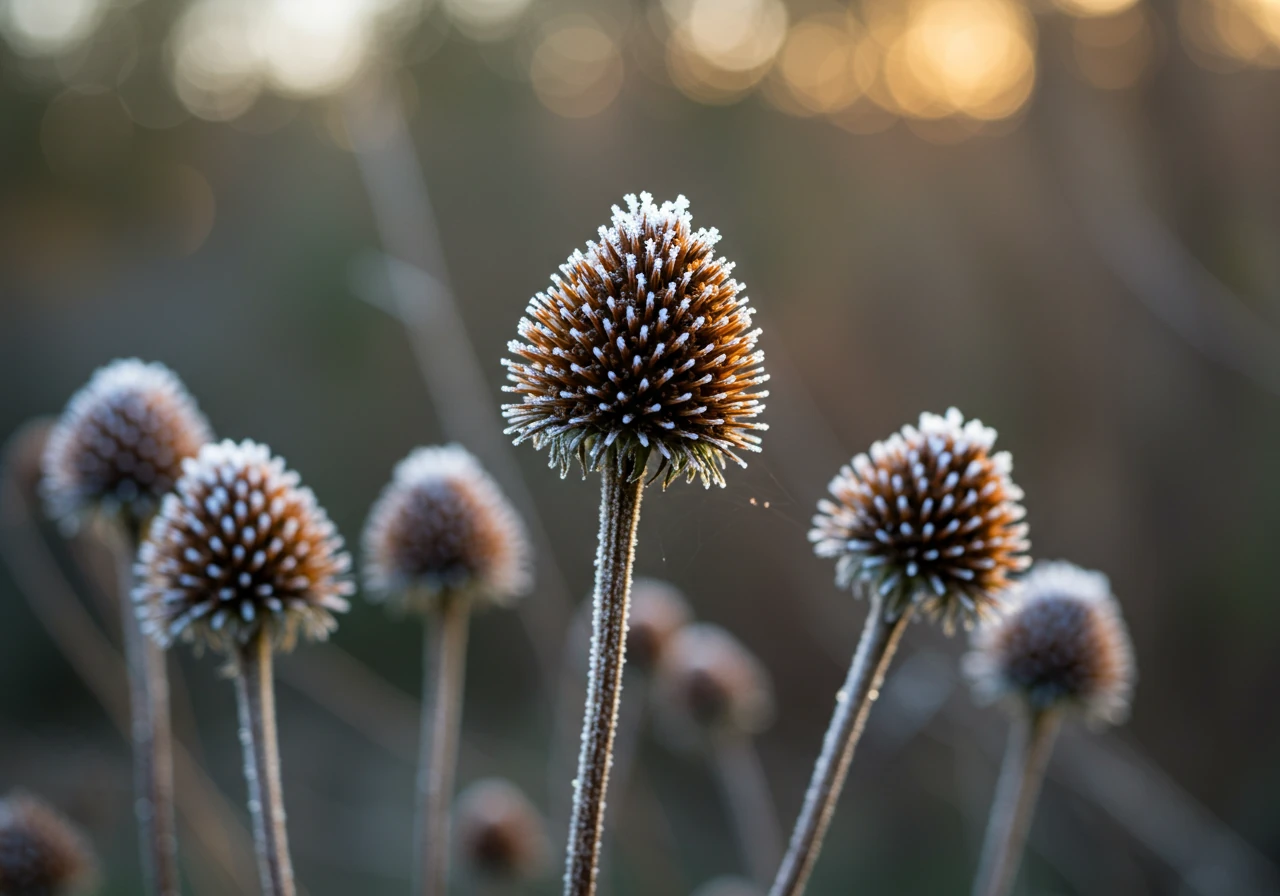
The Great Perennial Debate: To Cut or Not to Cut?
This is always a hot topic amongst gardeners! Should you chop down all your perennial stems in the fall, or leave them standing? Honestly, there are good reasons for both approaches, and the "right" answer often depends on the plant, your garden style, and your tolerance for winter "messiness." Local resources like the Ottawa Horticultural Society might offer specific plant advice too.
- Team Cut Back:
- Pros: Tidy look, removes diseased foliage (prevents overwintering spores), potentially faster spring cleanup, may deter rodents. Favoured in formal Manotick gardens.
- Cons: Removes winter interest, natural insulation, habitat/food for wildlife.
- Team Leave Standing:
- Pros: Winter visual interest, feeds birds, traps snow insulation, provides insect habitat. Common in naturalistic Osgoode gardens.
- Cons: Can look untidy, may harbour disease/pests if unhealthy, potentially more spring cleanup.
- The Compromise: Cut back disease-prone plants (hostas, mildewed phlox) and leave sturdy, attractive seed heads (Sedum, Coneflowers, Grasses). Always remove clearly diseased material. Consider options for property cleanup services if the task is large.
Planting Spring Dreams: Bulb Basics
Fall is prime time for planting spring-flowering bulbs like tulips, daffodils, hyacinths, crocus, and alliums. Getting them in the ground *before* it freezes solid allows them to establish roots.
- Timing is Key: Aim for September through October in the Ottawa area. Soil should be cool but workable.
- Depth Matters: Plant bulbs 2-3 times as deep as the bulb is tall (e.g., 2-inch tulip goes 4-6 inches deep). Check package directions!
- Location, Location, Location: Most need well-draining soil. Amend heavy clay with compost. Full sun to part sun is usually best. Proper garden install techniques matter here.
- Critter Control: Squirrels love tulips/crocus. Plant deeper, use chicken wire (remove in spring), or choose critter-resistant bulbs like daffodils/alliums.
The Mulch Blanket: Winter Insulation
Applying a layer of mulch after the ground has started to cool but *before* it freezes solid is one of the best things you can do. Mulch insulates soil, prevents frost heave, conserves moisture, and suppresses weeds.
Shredded Bark
Pros: Looks tidy, breaks down slowly, good insulator.
Cons: Can sometimes mat down, may slightly lower soil pH over time.
Straw
Pros: Excellent insulator, lightweight, inexpensive.
Cons: Can blow around easily, may contain weed seeds, looks less formal.
Chopped Leaves
Pros: Free resource!, adds organic matter as it decomposes, good insulator.
Cons: Can mat if applied too thickly or wet, best if shredded first.
Pine Needles
Pros: Lightweight, allows water/air flow, breaks down slowly.
Cons: Can make soil slightly more acidic (good for acid-lovers!), less common locally.
Apply a 2-4 inch layer, keeping it slightly away from the base of plant stems or tree trunks to prevent rot and discourage pests. Need help deciding or applying? Our team is knowledgeable; find out more about us and our approach to garden care.
Final Bed Tidying
Besides dealing with perennials and mulching, a general cleanup helps:
- Remove all dead annual plants.
- Do one last light weeding – every weed pulled now is one less competing next spring.
- Gently rake fallen leaves *out* of garden beds, especially off the crowns of evergreen perennials, to prevent rot.
Feeling overwhelmed by the fall garden checklist? We get it! Preparing your landscaping for winter takes time. If you need a hand, our professional City Garden Maintenance Service is designed to help Ottawa homeowners. We handle everything according to best practices, outlined clearly when you book – review our terms and conditions. For questions or a quote, please contact us. Your privacy is important; see our privacy policy.
Winter Armor: Protecting Vulnerable Trees and Shrubs
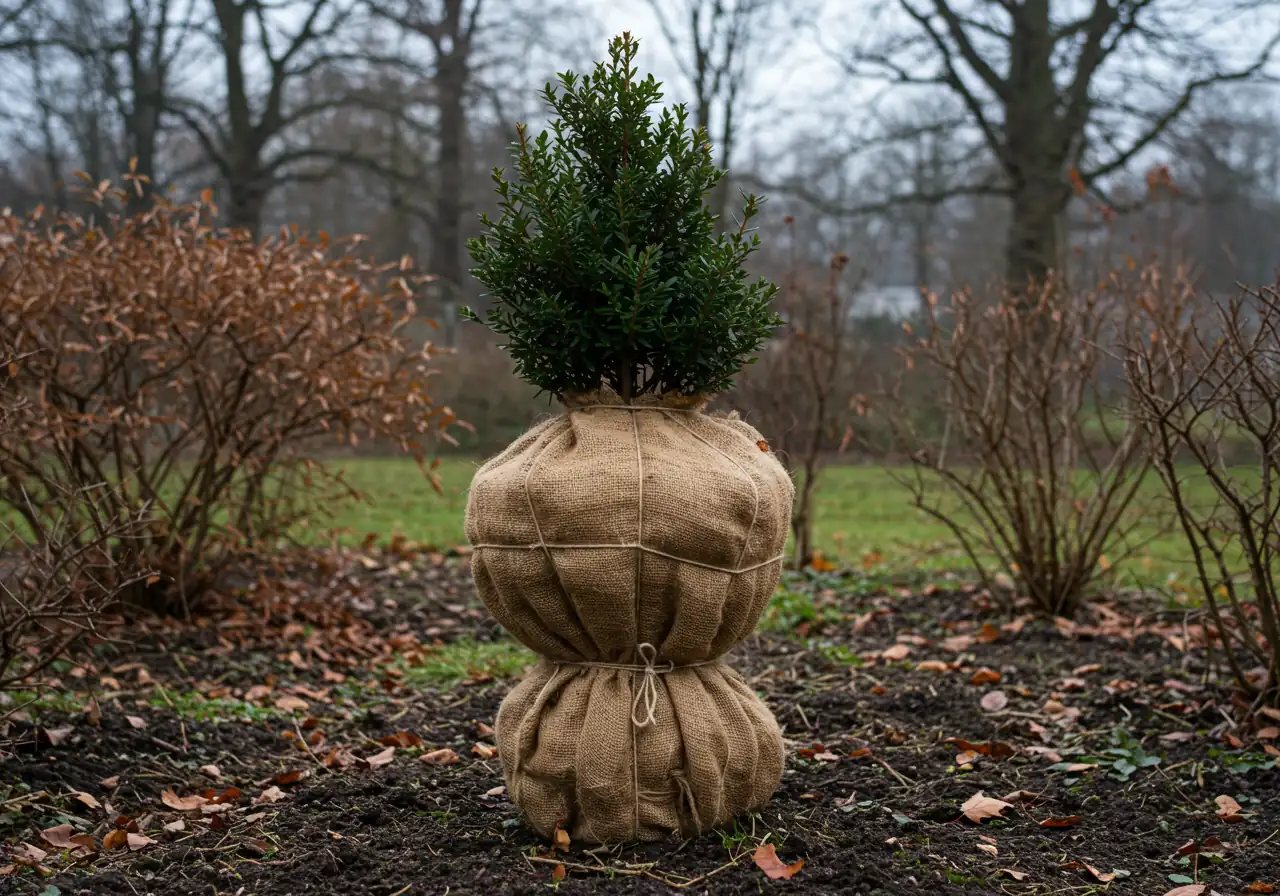
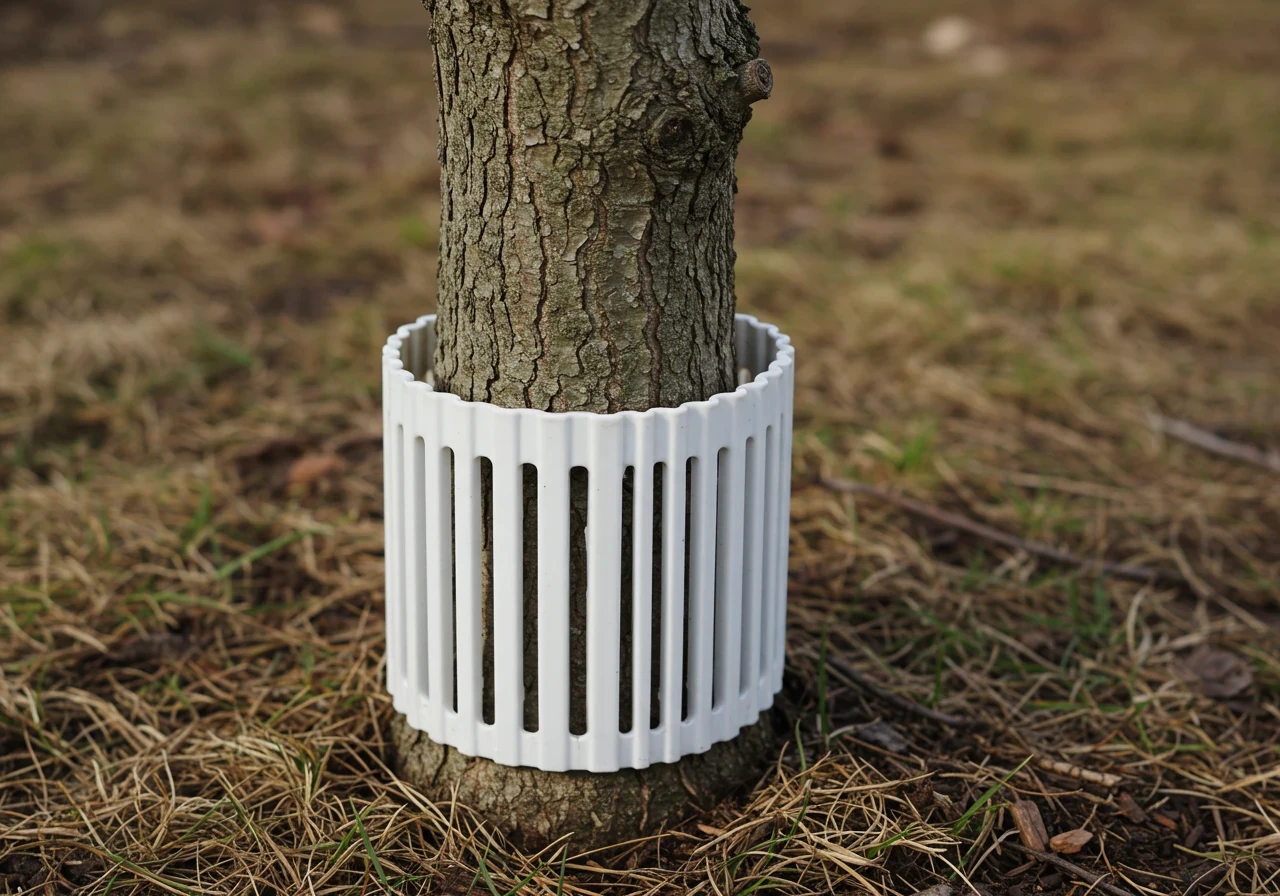
Okay team, let's talk about the bigger players in your garden landscape – your trees and shrubs. While many are tough cookies, bred for our chilly Ottawa winters, some, especially young ones or specific varieties, need a bit of extra coddling to make it through unscathed. Think of it as giving them some sturdy winter armor against windburn, sunscald, hungry critters, and drying out. Ignoring them could mean dealing with damaged bark, dead branches, or worse come springtime.
First up: hydration! It sounds odd when things are freezing, but *late-fall watering* is crucial, particularly for evergreens (like pines, cedars, rhododendrons) and anything newly planted this year (consider this after services like Sod Installation near trees). Water them deeply until the ground freezes solid. Why? Frozen ground means plants can't absorb water, but winter wind and sun still pull moisture from their leaves or needles. Well-hydrated plants enter winter much less stressed and are less likely to dry out – a condition called desiccation.
Now for the physical barriers:
- Burlap Wraps: Got broadleaf evergreens (like rhododendrons) or conifers (like cedars and upright junipers) exposed to harsh winter wind or intense afternoon sun? Burlap is their best friend! Wrap vulnerable shrubs loosely with burlap, securing it with twine. This shield protects against drying winds and prevents sunscald. Don't wrap too tightly – allow air circulation. Remove in spring! Complex wrapping might be part of a City Garden Maintenance Service.
- Tree Guards: Young trees with thin bark are vulnerable to rabbits and voles, especially in snowy conditions like in Richmond or Kars. Protect the base with plastic spiral guards or hardware cloth cylinders, extending above the expected snow line. These also help prevent sunscald and frost cracks. Ensure you’ve completed Mulching and Edging first, pulling mulch slightly away before installing the guard.
- Rose TLC: Tender roses (hybrid teas, floribundas) need help. Once dormant, mound loose soil, compost, or well-rotted manure around the base, covering the bud union by 8-12 inches. Use clean material, perhaps sourced like materials from a Metcalf Yard Cleanup Service. Gently tie canes together. Hardy shrub roses usually fend for themselves. Find specific care details through our garden maintenance services.
- Anti-Desiccant Sprays: For extra protection on vulnerable evergreens, consider an anti-desiccant spray. Applied late fall (above freezing), these waxy coatings reduce water loss. It's a *supplement*, not a replacement for watering or burlap.
Taking these protective steps helps ensure your woody plants survive and thrive, contributing to a beautiful landscape year after year. Healthy trees complement good Lawn Care and make Transformations more stunning. A little armor now means less worry later!
Final Touches: Tool Care, Water Systems, and Eco-Friendly Cleanup
Phew! You’ve pruned, protected, and pampered your plants. Before you hang up your gardening gloves for good (at least until spring!), there are a few final chores that make a world of difference. Think of this as packing away the summer gear properly – it saves headaches later! Taking care of your tools, water systems, and doing a responsible cleanup ensures everything is ready to roll when the snow melts.
First up, let’s show those trusty tools some love:
- Clean 'em Up: Scrape off mud and gunk from shovels, trowels, pruners, mower blades. Use a brush, water, and rubbing alcohol for sap.
- Sharpen & Shine: Sharpen blades on shears, loppers, shovels. Wipe metal parts with an oily rag (vegetable oil works) to prevent rust.
- Store Smart: Put clean, dry, oiled tools away in a shed/garage, preferably hanging. Ready for next season's Lawn Care!
Next, let's talk water. Frozen water expands and damages hoses, pipes, and barrels:
- Hoses: Disconnect, drain completely, coil loosely, store indoors/garage.
- Irrigation Systems: In-ground systems *must* be professionally blown out. Simple drip systems might be drainable manually.
- Rain Barrels: Empty completely, rinse sludge, store upside down or sheltered.
Finally, the cleanup. Be eco-friendly:
- Compost Power: Leaves are garden gold! Compost them or shred with a mower for mulch. Great for improving Soil Preparation next spring.
- Responsible Disposal: Check City of Ottawa guidelines for yard waste collection (use paper bags!). If overwhelmed, our City Property Cleanup Service can help manage leaves and branches responsibly, whether you're in Barrhaven or closer to Vernon or Kenmore.
Completing these final tasks sets the stage for amazing spring Transformations. Consider this our big Thank You for caring for your landscape! Now, go enjoy that hot chocolate.
Estimated Time Savings with Fall Prep (vs. Spring Catch-Up)
Quick Fall Prep Wins!
Feeling the autumn time crunch in Ottawa or Nepean? Focus on these essentials for the biggest impact:
- Leaf Patrol Power Move: Rake or mulch-mow leaves off the lawn. Too much? Our comprehensive Ottawa city yard cleanup service can help.
- Wrap & Guard Duty: Use burlap for sensitive evergreens and tree guards for young trees after adjusting mulch. Key for ongoing garden maintenance.
- Lawn's Final Feast & Trim: Mow slightly shorter (2.5 inches) and apply winterizer fertilizer. Vital for fall property clean up.
- Drain Before the Pain: Empty hoses, rain barrels, irrigation (pros for in-ground). Prevents costly damage and ensures readiness for spring landscape transformations.
- Mulch Magic for Beds: Apply 2-4 inches of mulch after cleanup and soil cooling. Insulates roots. We offer this in areas like our Marionville yard cleanup service region.
Tackling these sets your landscape up for winter success!
Ottawa Fall Gardening FAQs: Your Questions Answered
Fall gardening in Ottawa can bring up a few head-scratchers! Here are answers to common questions from gardeners across the region, from Winchester to Nepean.
Ideally, you want most tasks done before the ground freezes solid, usually sometime in November in the Ottawa area. Key things like planting bulbs, aerating the lawn, and major perennial division need warmer soil. However, basic leaf removal, applying mulch (after the ground cools!), and putting up winter protection like burlap or tree guards can often be done right up until the first permanent snowfall makes it impossible. If you're feeling behind schedule as the frost sets in, focusing on protecting vulnerable plants and clearing heavy leaf cover off the lawn is better than nothing! If time truly gets away from you, getting professional help for a complete fall property clean up can be a real lifesaver. Maybe check our services for Ottawa Property Cleanup or City Garden Clean Up Service.
Absolutely! Clay soil holds water like a champion sponge, which isn't great when that water freezes and expands around plant roots. Good drainage is key. Avoid working or walking on wet clay soil in the fall, as this causes compaction, making drainage even worse. Adding organic matter like compost in the fall (gently worked into the top layer or used as mulch) is fantastic for gradually improving structure. Ensure water drains *away* from foundation plantings and garden beds. If pooling water is a constant issue, addressing grading might be necessary. For larger areas needing soil improvement or serious drainage work, sometimes a comprehensive property cleanup service in areas like Metcalfe can incorporate addressing these tougher soil challenges. Or consider options in neighbouring areas like our Metcalfe garden clean up service.
Not necessarily! It really depends on the *type* of rose. Many modern shrub roses (like the Explorer or Parkland series) are bred for Canadian winters and are quite hardy – they usually just need basic cleanup and maybe some mulch around the base. However, more tender types like Hybrid Teas, Floribundas, and Grandifloras definitely need extra TLC in our Zone 5 climate. These benefit significantly from the mounding technique (piling soil or compost around the base) after they go dormant. If you're unsure which type you have and what level of protection is needed, it's something you could ask about; we're happy to get specific advice during an estimate feedback review if we're looking at your garden, perhaps as part of an Ottawa garden clean up service.
Ugh, voles and rabbits can be destructive little ninjas in the winter garden! The best defense is a physical barrier. Use plastic tree guards or cylinders of hardware cloth (wire mesh) around the base of young trees and vulnerable shrubs. Make sure the guard extends above the likely snow line – critters can tunnel under the snow! Keep mulch pulled back a few inches from the trunk itself, as deep mulch provides cozy vole habitat right where you don't want it. Also, keeping the area generally tidy by removing leaf piles and debris reduces hiding spots. A thorough fall cleanup is your first line of defense.
Mowing leaves into your lawn is fantastic... up to a point! If the layer of shredded leaves is so thick that you can't see any grass blades underneath, it's too much and can smother the lawn. For moderate amounts, it's a great way to add nutrients. If you're truly buried in leaves, composting the excess is the next best eco-friendly option. However, we understand that sometimes the volume is just overwhelming, especially with large, mature trees. If composting isn't feasible or you simply don't have the space or time, bagging for municipal pickup (using paper yard waste bags, please!) is better than letting them smother your lawn or garden beds. For truly massive leaf situations, sometimes calling in reinforcements makes sense; our teams, including those providing specialized leaf management like our Marionville garden clean up service, have the equipment to handle huge volumes efficiently.
Ah, the dreaded bulb heave! That's usually caused by the freeze-thaw cycles common in Ottawa winters. When the soil repeatedly freezes and thaws, the expansion and contraction can literally push bulbs (especially smaller ones or those not planted deeply enough) upwards. To prevent this: 1) Make sure you're planting bulbs at the correct depth – usually 2-3 times the bulb's height. Deeper planting provides more stability. 2) Apply a layer of mulch (2-3 inches) *after* the ground has started to get cold but *before* it freezes solid. This insulation helps moderate soil temperature swings, reducing the dramatic freeze-thaw action that causes frost heave. It’s a simple step that makes a big difference!
Conclusion: Reap the Rewards of Fall Prep This Spring
Well folks, there you have it! Putting in a little elbow grease now during autumn really does pay off big time come spring. Think of it less as a chore and more as an investment in next year’s beauty and enjoyment. When your neighbours in Russell, Barrhaven, or Manotick are frantically trying to undo winter damage, you can sip your coffee and watch your garden wake up beautifully. That healthy lawn, those eager perennials pushing through the soil, and those undamaged shrubs are the direct results of the *fall prep* work you tackled.
Instead of facing a long list of spring cleanup tasks and potential plant losses, you'll be greeted by a landscape ready to thrive. You’ve given your garden the best possible head start against whatever Old Man Winter threw at it. So, give yourself a pat on the back!
Feeling like you could use a hand getting your property ready before the snow flies? Don't hesitate to reach out! Whether you need a full *fall yard cleanup*, specific *garden maintenance*, or help protecting vulnerable plants in Russell, Metcalfe, Greely, or surrounding Ottawa areas, we're here to help. Contact us today for a free estimate and let us handle the heavy lifting so you can truly relax and look forward to a gorgeous spring!

